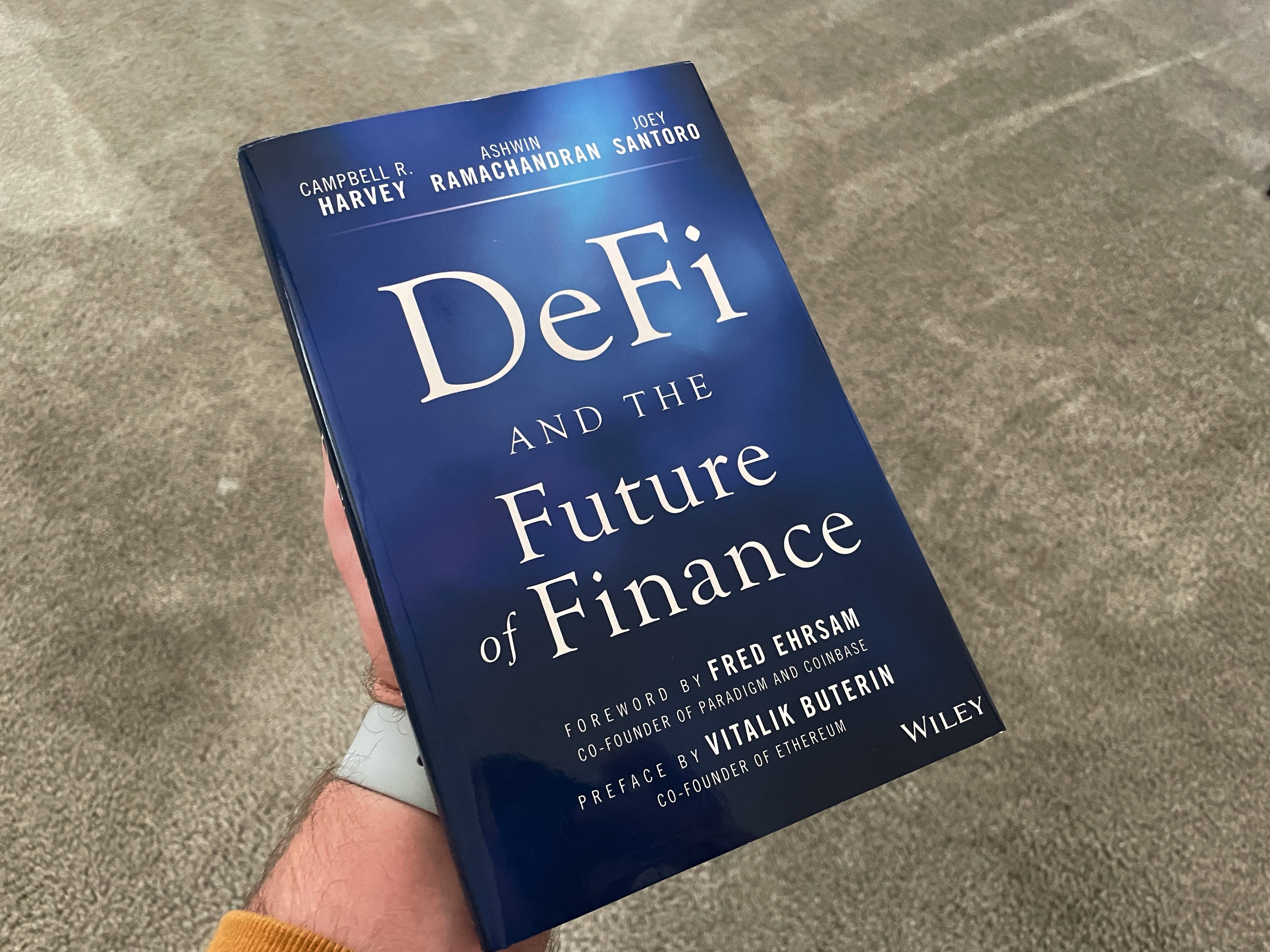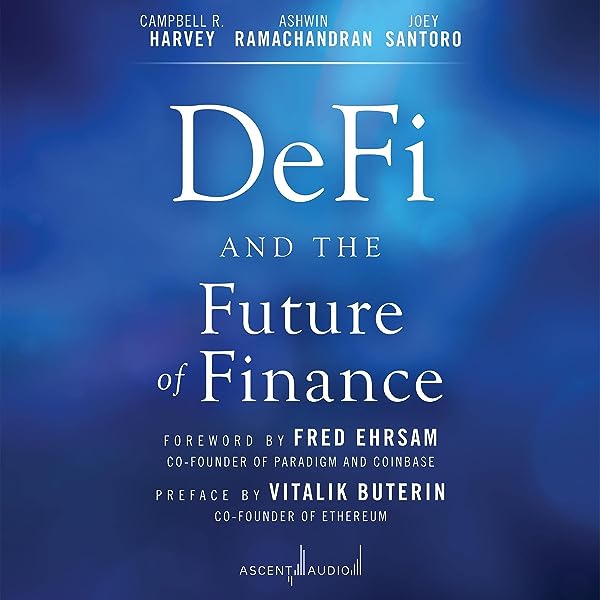Defi Innovations is a cutting-edge platform that revolutionizes decentralized finance solutions worldwide. With advanced technology and seamless integration, they empower users with secure and efficient financial transactions.
As the demand for DeFi continues to grow, Defi Innovations stands out for its commitment to innovation and user-centric services. Transforming the traditional financial landscape, Defi Innovations is reshaping the industry with its forward-thinking approach. By providing a decentralized ecosystem, they enable individuals and businesses to access a wide range of financial services, from lending and borrowing to asset management and trading.
With Defi Innovations, the future of finance is decentralized, secure, and accessible to everyone.
How Defi Innovations Are Reshaping The Financial Landscape
Defi Innovations are revolutionizing the financial landscape by providing decentralized solutions, offering better access to loans, investments, and financial services. This new technology is reshaping how we interact with money, making it more secure, transparent, and accessible to everyone.
Defi Innovations: Reshaping The Financial Landscape
Cryptocurrency and blockchain technology have paved the way for groundbreaking innovations in the financial sector. DeFi, short for decentralized finance, is one such innovation that is disrupting traditional finance systems. With its ability to offer open and borderless financial services, DeFi is reshaping the financial landscape.
In this blog post, we’ll explore how various DeFi innovations are transforming the way we think about and interact with money.
Defining Defi: Understanding The Basics
DeFi, as the name suggests, refers to a system where financial services are built on decentralized networks using smart contracts. By utilizing blockchain technology, DeFi eliminates the need for intermediaries such as banks or brokers, providing users with direct control over their assets and transactions.
Here are the key aspects that define DeFi:
- Peer-to-Peer Transactions: DeFi enables individuals to transact directly with one another without the involvement of intermediaries, allowing for fast and seamless peer-to-peer transactions.
- Decentralized Applications (dApps): DeFi applications, or dApps, are built on decentralized networks, offering a wide range of financial services such as lending, borrowing, investing, and trading.
The Rise Of Decentralization: Removing Third-Party Intermediaries
One of the significant impacts of DeFi is the removal of third-party intermediaries from the financial ecosystem. This decentralization brings several benefits, including:
- Greater Financial Inclusion: DeFi opens up access to financial services for individuals who have limited or no access to traditional banking systems, giving them control over their financial lives.
- Reduced Costs: By eliminating intermediaries, DeFi reduces transaction fees, making financial services more affordable and accessible to a broader range of individuals.
- Improved Transparency: The decentralized nature of DeFi ensures transparency in transactions, as all data is recorded on the blockchain, making it auditable and accountable.
Tokenization: Unlocking The Power Of Digital Assets
Tokenization is another revolutionary concept within DeFi that is transforming the way we view and utilize digital assets. Tokenization involves representing real-world assets, such as real estate or art, as digital tokens on the blockchain. Here’s why tokenization is gaining traction:
- Fractional Ownership: Tokenization allows for the division of assets into smaller, more affordable units, enabling fractional ownership. This democratizes investment opportunities and makes high-value assets accessible to a wider audience.
- Increased Liquidity: By tokenizing assets, liquidity can be unlocked, enabling owners to trade their tokens on decentralized exchanges, providing a more efficient market for buyers and sellers.
- Immutable Ownership: Tokenization ensures that ownership of digital assets is immutable and recorded on the blockchain, reducing fraud and enhancing security.
Smart Contracts: Automating Transactions With Efficiency
At the core of DeFi lies smart contracts, which are self-executing contracts with predefined conditions coded into the blockchain. These contracts automate transactions, ensuring efficiency and enhancing trust. Here’s how smart contracts are revolutionizing finance:
- Automated Transactions: Smart contracts eliminate the need for intermediaries by automatically executing transactions when certain pre-set conditions are met. This reduces the dependency on manual processes and minimizes human error.
- Programmability: Smart contracts enable the creation of complex financial instruments and protocols, such as decentralized exchanges and lending platforms, providing users with a high degree of control and customization.
- Trustless Environment: By being powered by blockchain technology, smart contracts provide a trustless environment, ensuring that transactions can be carried out securely without relying on any central authority.
With DeFi’s innovative features such as decentralized applications, tokenization, and smart contracts, the financial landscape is undergoing a significant transformation. The power to control and manage financial activities is shifting towards individuals, opening up exciting opportunities for a more inclusive and efficient financial future.
Key Players In The Defi Ecosystem
Defi Innovations has seen the emergence of key players shaping the ecosystem. These players are at the forefront of revolutionizing decentralized finance and include platforms such as Compound, Aave, Synthetix, and Uniswap. Their innovative solutions are transforming traditional financial systems and paving the way for a decentralized future.
Ethereum And The Foundation Of Defi
Ethereum is the revolutionary blockchain platform that kick-started the decentralized finance (Defi) movement. It has become the foundation upon which numerous Defi projects and innovations have been built. Here are some key points to understand about Ethereum’s role in the Defi ecosystem:
- Smart Contracts: Ethereum’s core feature is its ability to support smart contracts, which are self-executing contracts with predefined rules and conditions. These smart contracts enable the automation of financial transactions, removing the need for intermediaries and allowing for direct peer-to-peer interaction.
- Decentralization: One of the fundamental principles of Ethereum is decentralization. Unlike traditional financial systems that rely on central authorities, Ethereum promotes a decentralized approach where power and decision-making are distributed among its network participants. This decentralization provides greater access, security, and transparency in the Defi ecosystem.
- Liquidity: Ethereum has a highly liquid native cryptocurrency called Ether (ETH), which fuels the Defi ecosystem. Ether serves as the primary medium of exchange within the ecosystem, facilitating the smooth operation of various Defi protocols, platforms, and applications.
- Interoperability: Ethereum’s open-source nature has allowed developers to build a vast array of Defi projects. These projects can interact and integrate with one another, creating a vibrant Defi ecosystem with interoperable protocols and platforms. This interoperability fosters innovation, collaboration, and the seamless movement of assets within the Defi space.
The Role Of Daos: Decentralized Autonomous Organizations
Decentralized Autonomous Organizations (DAOs) are an integral part of the Defi ecosystem, reshaping how organizations are governed and operated. Here’s what you need to know about DAOs:
- Autonomy and Governance: DAOs are autonomous entities that operate on the blockchain without the need for centralized control. They are governed by a set of predefined rules, which are enforced through smart contracts. This decentralized governance allows DAOs to make decisions collectively, giving each participant a voice and voting power.
- Transparency and Trust: DAOs leverage the transparency and immutability of blockchain technology to establish trust and accountability within their operations. All transactions and decisions made by DAOs are recorded on the blockchain, enabling anyone to verify and audit their activities. This transparency eliminates the need to rely on intermediaries and fosters a higher level of trust among participants.
- Community Participation: DAOs encourage community participation by allowing individuals to become members and contribute to the decision-making process. Members can propose and vote on initiatives, allocate funds, and shape the direction of the organization. This inclusive approach empowers individuals, promotes innovation, and aligns the interests of the community with the DAO’s objectives.
- Diverse Applications: DAOs have diverse applications beyond finance, ranging from decentralized governance of organizations and projects to the management of shared resources. They can be utilized across various industries, enabling communities to collaborate, govern, and drive change in a decentralized and transparent manner.
Protocols And Platforms: Leading The Charge
Protocols and platforms play a crucial role in the Defi ecosystem, providing the infrastructure and frameworks for decentralized financial activities. Here are some key aspects to understand about protocols and platforms:
- Intermediary Elimination: Protocols and platforms in the Defi ecosystem aim to eliminate intermediaries such as banks and traditional financial institutions. They leverage blockchain technology and smart contracts to enable direct peer-to-peer interactions, facilitating lending, borrowing, trading, and other financial services in a trustless manner.
- Liquidity Mining: Many Defi protocols incentivize users to participate by offering rewards in the form of native tokens. This practice, known as liquidity mining, encourages liquidity provision, enhances market depth, and helps bootstrap these protocols. Liquidity providers earn these tokens by depositing their assets into decentralized liquidity pools.
- Innovation and Experimentation: The Defi space is highly innovative, with numerous protocols and platforms being developed continuously. This environment allows for experimentation with novel financial models, asset classes, and mechanisms such as decentralized exchanges (DEXs), lending and borrowing protocols, stablecoins, and more. This ongoing innovation drives the growth and evolution of the Defi ecosystem.
- Challenges and Risks: While Defi presents exciting opportunities, it also faces challenges and risks. These include security vulnerabilities, smart contract bugs, regulatory uncertainties, and the reliability of decentralized oracles. As the Defi ecosystem continues to mature, addressing these challenges and enhancing the security and stability of protocols and platforms will be crucial for widespread adoption.
In the rapidly evolving Defi ecosystem, Ethereum lays the foundation, DAOs bring decentralized governance, and protocols and platforms pave the way for innovation. Together, these key players are transforming traditional finance, unlocking new possibilities, and revolutionizing how we interact with money and financial services.
Exploring Different Defi Use Cases
Uncover the innovative possibilities of decentralized finance (DeFi) as we explore various use cases. Discover how DeFi is revolutionizing the way we invest, trade, and manage financial assets in a decentralized ecosystem. Experience the power of DeFi innovations firsthand.
Defi Lending And Borrowing: A New Way To Access Capital
Are you looking for a new way to access capital? Defi lending and borrowing platforms might be the solution you’ve been searching for. These platforms use blockchain technology to remove the need for intermediaries such as banks, allowing users to lend and borrow directly from each other.
Here are some key points to know about defi lending and borrowing:
- Peer-to-peer lending: Defi lending platforms connect lenders and borrowers directly, eliminating the need for a middleman. This enables borrowers to access funds quickly and at lower interest rates, while lenders can earn interest on their idle crypto assets.
- Overcollateralization: Unlike traditional lending, defi lending platforms usually require borrowers to provide collateral in the form of cryptocurrency. This collateral serves as security for the lender in case the borrower defaults. Due to the transparent nature of blockchain, the collateralization process is automated and provides a higher level of trust for all participants.
- Automated smart contracts: Defi lending platforms utilize smart contracts, self-executing contracts with predefined rules and conditions written into code. These contracts automate the lending and borrowing process, ensuring transparency and removing the need for intermediaries.
- Stablecoin lending: Stablecoins, cryptocurrencies that are pegged to a stable asset such as a fiat currency, have gained popularity in defi lending. They provide stability and reduce the risk of price volatility, making them attractive assets for borrowers and lenders.
Decentralized Exchanges: Trading Without Centralized Intermediaries
When it comes to trading cryptocurrencies, decentralized exchanges (DEXs) have introduced a groundbreaking concept. Unlike traditional centralized exchanges that rely on intermediaries, DEXs allow users to trade directly with one another. Here’s what you need to know about decentralized exchanges:
- User control: DEXs give users full control over their funds and transactions. Instead of depositing funds into an exchange-controlled wallet, users maintain ownership of their assets in their personal wallets. This reduces the risk of hacks or loss due to exchange vulnerabilities.
- No KYC requirements: Most decentralized exchanges do not require Know Your Customer (KYC) verification, promoting privacy and anonymity for users. Traders can engage in peer-to-peer transactions without disclosing personal information.
- Liquidity pools: DEXs commonly utilize liquidity pools where users contribute their funds to facilitate trading. These pools consist of smart contracts that automatically execute trades based on predefined rules. By contributing to a liquidity pool, users can earn fees as a reward.
- Seamless cross-chain trading: Some DEXs support cross-chain transactions, allowing users to trade assets from different blockchains. This eliminates the need for multiple exchanges and enhances the overall trading experience.
Yield Farming: Maximizing Returns In The Defi World
In the world of defi, yield farming has emerged as a popular way to maximize returns on crypto assets. Also known as liquidity mining, yield farming involves providing liquidity to decentralized finance protocols in exchange for rewards. Here’s what you should know about yield farming:
- Return on idle assets: Yield farming enables users to earn passive income on their idle cryptocurrency holdings. By providing liquidity to various defi platforms, users can earn rewards in the form of additional tokens or fees.
- Staking and farming: Yield farming often involves staking your cryptocurrency assets in liquidity pools or yield farming smart contracts. These actions make your assets available for lending, borrowing, or trading, generating income for the user.
- Risks and complexities: Although yield farming offers attractive rewards, it is important to consider the risks involved. Smart contract vulnerabilities, impermanent loss, and changes in market conditions can all impact the overall profitability of yield farming strategies. Users must conduct thorough research and understand the risks before participating.
- Diversification: Yield farming allows users to diversify their portfolio and earn rewards from multiple defi protocols. By allocating assets to different platforms, users can spread their risks and potentially benefit from various opportunities.
Insurance And Risk Management: Protecting Defi Users
As the defi ecosystem continues to grow, the need for insurance and risk management solutions becomes essential. Defi platforms face various risks, including smart contract vulnerabilities, price volatility, and liquidity issues. Here’s how insurance and risk management play a crucial role in protecting defi users:
- Smart contract insurance: Smart contract vulnerabilities can lead to hacks or exploitation, resulting in massive financial losses. Insurance providers within the defi space offer coverage against such risks, providing users with an added layer of protection.
- Risk assessment and auditing: Before engaging with a defi protocol, users should consider its level of risk. Auditing services can evaluate the security of smart contracts and identify potential vulnerabilities, helping users make informed decisions.
- Decentralized insurance pools: Defi platforms also provide decentralized insurance pools where users can pool their funds to protect against losses. These pools operate similarly to liquidity pools, spreading the risk among participants and compensating them in case of protocol failures or hacks.
- Dynamic coverage and premiums: Some defi insurance platforms offer dynamic coverage that adjusts based on market conditions and risks. Premiums are typically paid in the form of tokens, and coverage terms can be customized to suit individual needs.
In the evolving landscape of defi innovations, lending and borrowing, decentralized exchanges, yield farming, and insurance and risk management all serve critical roles. Each use case brings unique benefits and challenges, offering users numerous opportunities to participate in the defi world.
Understanding these use cases empowers individuals to make informed decisions and navigate the defi space efficiently.

Credit: caia.org
The Challenges And Opportunities Of Defi Innovation
Defi innovation presents both challenges and opportunities, paving the way for decentralized financial solutions and revolutionizing the traditional financial landscape. This emerging field brings forth exciting prospects for investors, developers, and users alike.
Defi Innovations:
Decentralized Finance (DeFi) has emerged as a groundbreaking innovation in the cryptocurrency realm, revolutionizing traditional financial systems. As this disruptive technology gains momentum, it brings along both challenges and opportunities for its widespread adoption. In this blog post, we will explore some of these key areas, including scalability and network congestion, regulatory and compliance issues, security and auditing, and the exciting future prospects for DeFi collaboration and growth.
Scalability And Network Congestion: Overcoming The Limitations
DeFi platforms have faced significant challenges when it comes to scalability and network congestion. These issues can hinder the growth and efficiency of the technology. However, various solutions are being developed to address these limitations, including:
- Layer-2 Scaling Solutions: Implementing layer-2 scaling solutions such as sidechains and state channels can enhance scalability by processing transactions off the main blockchain.
- Optimistic Rollups: Optimistic rollups employ a technique that enables faster transaction processing and reduces network congestion, providing a more seamless user experience.
- Sharding: By partitioning the blockchain into smaller pieces called shards, this technique allows for parallel processing, significantly improving scalability.
Regulatory And Compliance Issues: Navigating Legal Frameworks
As DeFi continues to gain traction, regulatory and compliance issues present both challenges and opportunities for its future growth. Navigating legal frameworks can be complex, but with proper considerations and strategic initiatives, the following can be achieved:
- Increased Regulatory Clarity: Collaboratively working with regulatory bodies can help establish clearer guidelines and regulations specific to DeFi, fostering a supportive ecosystem for innovation.
- Compliance Standards: Developing robust compliance standards and frameworks that align with traditional financial regulations ensures transparency, security, and trust for participants in the DeFi space.
- Global Collaborations: Encouraging international collaborations and regulatory alignment would facilitate the adoption of DeFi across borders, fostering further innovation and growth.
Security And Auditing: Ensuring Trust In The Digital Age
Security is a critical aspect of DeFi innovation, and integrating reliable auditing processes is essential for user trust and confidence. To ensure the security of DeFi protocols, key measures include:
- Smart Contract Audits: Conducting thorough audits of smart contracts before deployment can mitigate vulnerabilities and prevent potential exploits, safeguarding user funds and reducing risks.
- Robust Security Practices: Implementing strict security practices, such as multi-signature wallets, two-factor authentication, and encryption techniques, strengthens the overall security infrastructure of DeFi platforms.
- Bug Bounties and Penetration Testing: Rewarding individuals for discovering and reporting vulnerabilities through bug bounty programs helps identify and fix potential security flaws proactively.
The Future Of Defi: Opportunities For Collaboration And Growth
The future of DeFi holds immense potential for collaboration and growth. By embracing upcoming opportunities, DeFi can achieve even greater heights. Some future prospects include:
- Cross-Chain Interoperability: Enabling seamless interaction between different blockchain networks will enhance DeFi’s functionality and create an interconnected ecosystem.
- Integration with Traditional Finance: Collaborating with traditional financial institutions and bridging the gap between DeFi and CeFi (Centralized Finance) can drive mainstream adoption and revolutionize the industry.
- Diverse Use Cases: Expanding the use cases of DeFi beyond lending and decentralized exchanges to areas like insurance, derivatives, and governance will attract a larger user base and fuel innovation.
While DeFi innovations face challenges such as scalability, regulatory compliance, and security concerns, the opportunities for growth and collaboration are vast. By overcoming these obstacles and capitalizing on future prospects, DeFi has the potential to reshape the financial landscape and empower individuals worldwide.
Frequently Asked Questions For Defi Innovations
What Are Defi Technologies?
DeFi technologies are blockchain-based systems that enable peer-to-peer financial transactions without intermediaries.
What Are The Top 3 Defi Projects?
The top 3 DeFi projects are Compound, MakerDAO, and Aave.
What Are The Defi Trends In 2023?
DeFi trends in 2023 will focus on increased adoption, improved security, regulatory compliance, and innovative financial products.
Is Defi A Good Investment?
DeFi can be a good investment choice due to potential high returns and decentralized nature.
Conclusion
Innovation in the world of Decentralized Finance (DeFi) has rapidly transformed the way we interact with financial systems. With its ability to provide secure, transparent, and censorship-resistant transactions, DeFi has opened doors to a more inclusive and efficient financial landscape.
This blog post has explored some of the most exciting DeFi innovations, including yield farming, decentralized exchanges, and synthetic assets. Yield farming has revolutionized investment opportunities by allowing users to earn passive income through lending and staking their cryptocurrencies. Decentralized exchanges, on the other hand, offer seamless and transparent peer-to-peer trading without the need for intermediaries.
Lastly, the creation of synthetic assets has provided users with a way to gain exposure to traditional financial instruments within the DeFi ecosystem. As we continue to witness the rapid growth and adoption of DeFi, it is clear that these innovations are reshaping the future of finance.
With their decentralized nature and focus on transparency and accessibility, DeFi innovations have the potential to revolutionize traditional financial systems and empower individuals globally. Embracing the opportunities presented by DeFi will not only provide financial freedom, but also contribute to the evolution of a more inclusive and equitable economic landscape for all.



